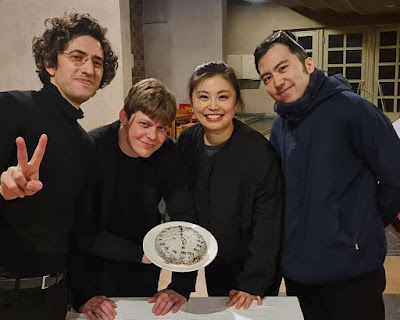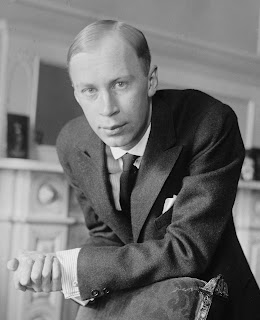Quartet Berlin-Tokyo. From left, Dmitri Pavlov, Tsuyoshi Moriya, Ruiko Matsumoto and Gregor Hrabar.
When Quartet Berlin-Tokyo decided to do a world-premiere recording of Gavriil Popov's 57-minute "Quartet-Symphony," the 1951 String Quartet in C Major, Op. 61, the members didn't want to be rushed. So the quartet created its own record label, taking four weeks for the recording, as violist Gregor Hrabar explains in the interview below.
The new album, which also includes a shorter piece by Czech composer Erwin Schulhoff, "Five Pieces for String Quartet," has received rave reviews. And fans of Popov are happy to be able to hear nearly an hour of his music for the first time; many of his compositions apparently remain unrecorded. The CD can be purchased directly from the group and is available from many of the usual online outlets and streaming services.
Quartet Berlin-Tokyo features musicians from all over the world. Violinist Tsuyoshi Moriya and cellist Ruiko Matsumoto are from Japan. Violinist Dmitri Pavlov was born in Russia, but his family emigrated to Israel. Gregor Hrabar was born in Slovenia but also has studied music in Austria and Berlin. Learn more about the group at the official site at https://www.quartetberlintokyo.com/.
The new album is the first issued by the quartet's own record label, "QBT Collection," as Hrabar explained when I interviewed him by email:
Russian Futurism: Can you say something about how your quartet discovered the Gavriil Popov "Quartet Symphony," and why you decided to feature it on your first recording?
Gregor Hrabar: We were approached by a composer friend of ours, who also wrote a book about forgotten Soviet composers. In his opinion Popov was one of the greatest, if not the greatest of them all. So when we had a look at the score and gave it a shot, we immediately knew we wanted to record it. To record it with a label was impossible for us back in the day due to financial reasons, plus we didn't want to go through yet another recording session where you would maybe have 5 days under microphones, trying to reach the deadline and focusing on not making mistakes, instead of taking time and pushing the limits. Thus "QBT Collection" was born.
Russian Futurism: Can you tell me the name of your composer friend, and his or her book? I would love to read it, if it's available in English.
Gregor Hrabar: His name is Boris Yoffe. He is a good friend of the quartet and his "Quartettbuch" miniatures kept our spirits up during lockdown's restrictions of performing. 37 of them landed on YouTube as part of our "Micro-Concerts" series and more are still to come. His book is called "Im Fluss des Symphonischen", though I'm not sure if it has ever been translated to English. You can find the German copy under this link, at https://www.wolke-verlag.de/musikbuecher/boris-yoffe-im-fluss-des-symphonischen/.
Russian Futurism: You mentioned that having your own label allowed you to take your time with the recording, and do it right. How long did it take to record the album?
Gregor Hrabar: The recording process itself took us four weeks, and it took me a total of four months to edit it. We had a sort of a gentleman's agreement that the recording session will be an open-end production without stress of deadlines, only finishing when everyone is happy. Of course one cannot overstretch into a never-ending process, as there will be a certain time window of productivity. Still, we loved the idea of slow-cooking the pieces, as it became a very pleasant experience, even if incredibly intense. For myself in particular, as I took on the role of the sound engineer and producer, basically living with the score and the audio takes day and night.
Russian Futurism: Can you say anything yet about upcoming recording projects?
Gregor Hrabar: The plan is to have two recording sessions per season. One will be for an annual release, as the concept is to introduce a new album each year. The other will be for a bigger production, containing more works of a single composer, which will, of course, take more time to finish, especially now that concerts and tours are starting again. Recording of Vol.2 is scheduled for the second half of August. Apart from our own production, we are planning to record all the Op.33 of Joseph Haydn this year, by a kind invitation of EuroArts who will produce a DVD in Austria and Japan.
Gregor Hrabar
Russian Futurism: I have heard you might be recording more Russian music, can you comment on that yet?
Gregor Hrabar: It's currently too soon to confirm that I'm afraid. With Popov and Schulhoff being such absolute unanimous choices of the group and Popov being such a titan, it has been difficult to find a piece that could fill such big shoes. Also research into the unknown is tricky and it takes time, with outcomes being uncertain until the very end. But we do share very big love for the Slavic repertoire.
Russian Futurism: Is Quartet Berlin-Tokyo going to tour the U.S. anytime soon?
Gregor Hrabar: It is certainly a wish an a plan in motion, yes. The CD and Popov himself seem to have quite a big fandom in the States to our big surprise (Schulhoff too, which seems to be less known there), and we have shipped quite a few copies there already. The request of people being able to hear it live as well is growing and if it does turn out to happen, it will most likely be in 2024 or later.
Russian Futurism: Your band is truly international, as your name implies. How did you get together? Is English the "lingua franca" you use to talk to each other?
Gregor Hrabar: My colleagues met in 2011 as members of HfM "Hanns Eisler" and UDK in Berlin. I joined them in 2018. As languages go, it is a rather funny mixture of English, German and Japanese. Sometimes a bit of Slavic too, depending on how heated the conversation is 😛









